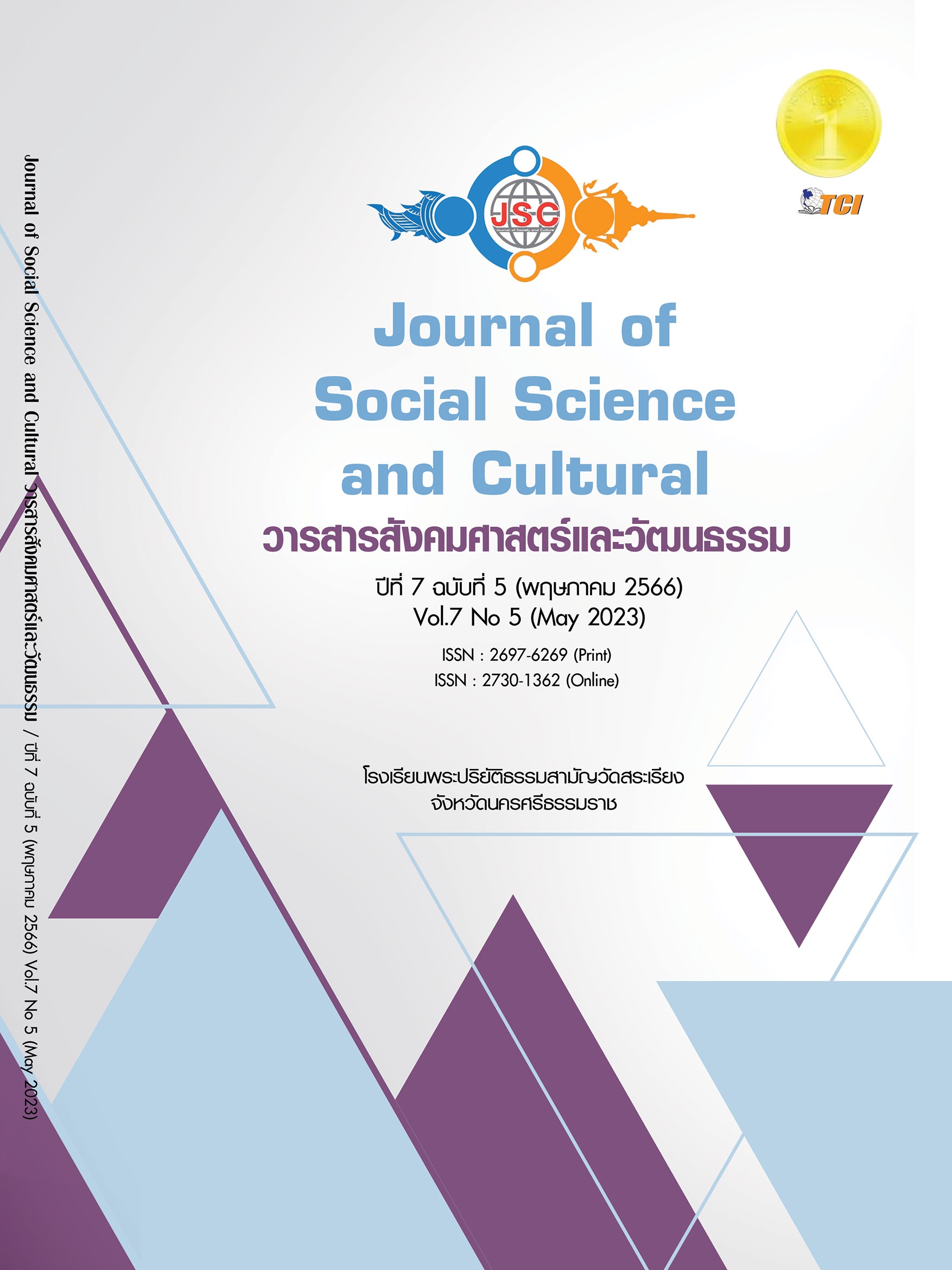THE ASSOCIATION BETWEEN SUBSATNCE LITERACY WITH SELF-CONTROL IN THE ETHNIC ELEMENTARY STUDENTS
Main Article Content
Abstract
The aimed of this research to investigate the association between substance literacy with self-control in a representative sample of ethnic elementary students. This cross-sectional study was conducted with ethnic elementary students, who were studying in the academic year 2021. Multi-stage random selection of 186 students. Demographic information questionnaire, self-control questionnaire, and substance literacy questionnaire were recorded by self-report. We used frequency, percent, mean, and standard deviation to illustrate general characteristics, used binary logistic regression analysis to determine the relationship between substance literacy with self-control. A total of 54.8% were female and 45.2% were male. Most of the participants are the Hmong (59.7%). The level of substance literacy of the sample group was found that 51.6% were low and 36.6% were moderate, those who were low and moderate of substance literacy were more likely to be low and moderate of self-control as compared to those who were higher level of self-control (OR: 3.09, 95% CI; 1.151 - 8.286, p < 0.05). Conclusion: most of the participants had low level of health literacy, those of them were associated with low to moderate self-control.
Article Details
References
ขวัญเมือง แก้วดำเกิง และนฤมล ตรีเพ็ชรศรีอุไร. (2554). ความฉลาดทางสุขภาพ. กรุงเทพฯ: สามเจริญพาณิชย์.
จิตรฎายิน เอี่ยมอุ้ย. (2549). ปัจจัยที่ส่งผลต่อพฤติกรรมการควบคุมตนเองไม่ให้เกี่ยวข้องกับอบายมุขของนักเรียนช่วงชั้นที่ 4 อำเภอเมือง จังหวัดราชบุรี. (ศิลปศาสตรมหาบัณฑิต). มหาวิทยาลัยศิลปากร, นครปฐม.
สุริยเดว ทรีปาตี. (2560). พัฒนาการและการปรับตัวในวัยรุ่น. Retrieved from http://www.nicfd.cf.mahidol.ac.th/th/images/documents/3.pdf
อังศินันท์ อินทรกาแหง. (2560). การสร้างและพัฒนาเครื่องมือความรอบรู้ด้านสุขภาพของคนไทย. กรุงเทพมหานคร: กองสุขศึกษา กรมสนับสนุนบริการสุขภาพ กระทรวงสาธารณสุข.
A.Flearya, S., Joseph, P., & E.Pappagianopoulos, J. (2018). Adolescent health literacy and health behaviors: A systematic review. Journal of Adolescence, 62, 112-127.
Alaska Division of Behavioral Health. (2011). Risk and Protective Factors for Adolescent Substance Use (and other Problem Behavior). In.
Apidechkul, T., Kaewtep, S., Suttana, W., & Chansareewittaya, K. (2018). Fectors supporting young Ethnic Minority male's engaging in commercial sex and accessing health care in Chiang Mai, Thailand. Journal of Public Health, 48(2).
Bae, S. M. (2017). The influence of strain factors, social control factors, self-control and computer use on adolescent cyber delinquency: Korean National Panel Study. Children and Youth Services Review, 78, 74-80.
Centers for Disease Control and Prevention (CDC). (2016). Epi Info™ 7 User Guide. Atlanta, Georgia (US). Division of Health Informatics & Surveillance (DHIS), Center for Surveillance, Epidemiology & Laboratory Services (CSELS).
Conover, K., & Daiute, C. (2017). The process of self-regulation in adolescents: A narrative approach. Journal of Adolescence, 57, 59-68.
Degan, T. J., Kelly, P. J., Robinson, L. D., Deane, F. P., & Baker, A. L. (2022). Health literacy and healthcare service utilisation in the 12-months prior to entry into residential alcohol and other drug treatment. Addictive Behaviors, 124, 107111.
Egerton, G. A., Colder, C. R., & Lee, Y. (2021). Testing the dual process model of adolescent cannabis use with prospective three-way interactions between self-regulation, negative outcome expectancies, and implicit cannabis attitudes. Addictive Behaviors, 118, 106902.
Geerlings, Y., Asscher, J. J., Stams, G.-J. J. M., & Assink, M. (2020). The association between psychopathy and delinquency in juveniles: A three-level meta-analysis. Aggression and Violent Behavior, 50, 101342.
Gottfredson, Michael R., & Travis Hirschi. (1990). A General Theory of Crime. Stanford: Stanford University Press.
Hyman, A., Stewart, K., Jamin, A.-M., Novak Lauscher, H., Stacy, E., Kasten, G., & Ho, K. (2020). Testing a school-based program to promote digital health literacy and healthy lifestyle behaviours in intermediate elementary students: The Learning for Life program. Preventive Medicine Reports, 19, 101149.
J.Chisolm, D., A.Manganello, J., J.Kelleher, K., & P.Marshal, M. (2014). Health literacy, alcohol expectancies, and alcohol use behaviors in teens. Patient education counseling journal, 97(2), 291–296.
Jirapa Khampisut. (2018). Health Literacy and Health Promotion Behaviors of Students in Naresuan University. Journal of Educational Measurement, Mahasarakham University, 24(1).
König, C., Skriver, M. V., Iburg, K. M., & Rowlands, G. (2018). Understanding Educational and Psychosocial Factors Associated with Alcohol Use among Adolescents in Denmark; Implications for Health Literacy Interventions. International Journal of Environmental Research and Public Health., 15.
Lemos, I., & Faísca, L. (2015). Psychosocial adversity, delinquent pathway and internalizing psychopathology in juvenile male offenders. Int J Law Psychiatry, 42-43, 49-57.
Mahathamnuchock, S. (2015). Health Promotion Behaviors of Sgaw Karens in Risk of Non-Communicable Disease (NCD). Nursing Journal Volume 42, 118-125.
McMullen, J. C. (1999). A Test of Self-control Theory Using General Patterns of Deviance. (Doctor of Philosophy.). Faculty of the Virginia Polytechnic Institute and State University, Blacksburg, Virginia.
Polit D.F., & Hungler BP. (1991). Nursing Research:Principles and methods. (Vol. 4th). Phiadephia: J.B.Lippincott.
Rolova, G., Gavurova, B., & Petruzelka, B. (2021). Health Literacy, Self-Perceived Health, and Substance Use Behavior among Young People with Alcohol and Substance Use Disorders. Int J Environ Res Public Health, 18(8).
Saowathan Phoglad. (2011). Effect of Self-Control Theory on the Recidivism of Criminal Offences against Person among Male Juvenile Delinquents in the Bangkok Metropolitan Area. Thai Human Resource Research Journal, 6.
Sohn, B., Buchanan, A., Heo, K. H., & Lee, J. J. (2019). Explanatory effects of young childhood caregiving environment, child’s pro-social behavior, and child self-regulation skills on adolescent problem behavior. Children and Youth Services Review, 100, 298-303.
Yangyuen, S., Mahaweerawat, C., Thitisutthi, S., & Mahaweerawat1, U. (2021). Relationship between health literacy in substance use and alcohol consumption and tobacco use among adolescents, Northeast Thailand. Journal of Education and Health Promotion, 1-6.


